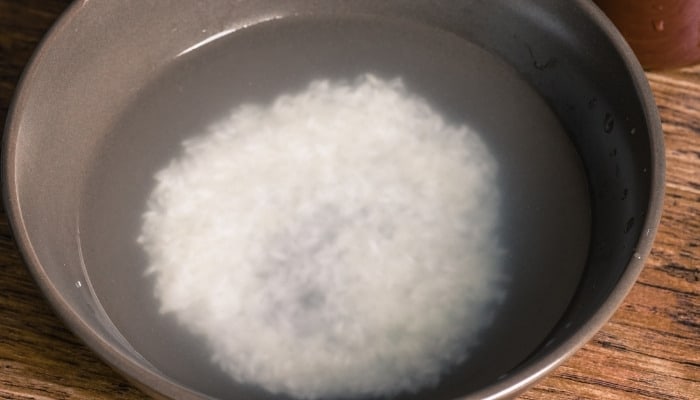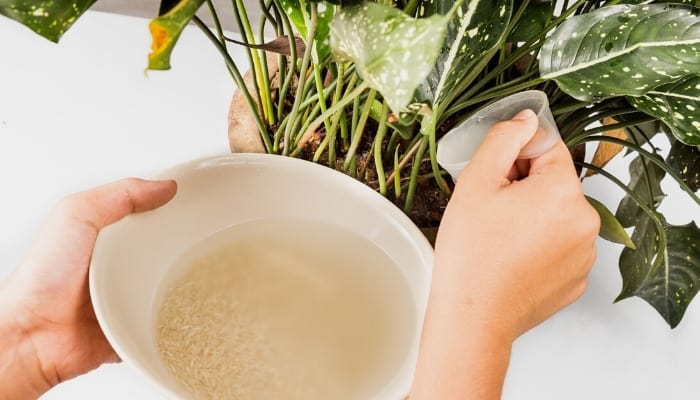Many people who adore plants are searching for more environmentally friendly options to use instead of store-bought fertilizers. As a result, strategies like using leftover rice water are being explored.
Conserving water and using zero chemicals? Sounds like a winner! But is rice water something you should really be feeding to plants?
Is rice water good for plants? Rice water contains a small number of beneficial vitamins and minerals, and the high starch content can provide energy to beneficial soil bacteria. However, rice water can also feed harmful bacteria in the soil, which can lead to severe fungal issues in plants that rely on organic matter to thrive.
Whether you soak or boil rice, the residual water will have some effect on your plants and soil (but not always for the better).
Keep reading to discover the pros and cons, how to apply it, and alternatives to rice water. Milk could be one of the alternatives! To learn more read our article here
Guide To Using Rice Water for Plants
Using up leftover rice water has its advantages, but it may not be the best thing to feed your plants regularly. Let’s learn a little more…
Is Rice Water a Fertilizer?
Rice water contains fairly small quantities of NPK (Nitrogen, Phosphorus, and Potassium), so it can’t realistically replace balanced fertilizer to deliver all your plant’s needs.
Rice Water From Washing/Soaking vs. Rice Water After Boiling
You can soak raw rice grains to let them swell and enrich the water or use leftover water from cooking rice, but boiled rice water will be slightly more beneficial.
Soaking the rice removes the outer layers from the grain (the bran and hull – the latter of which can be made into effective mulch!).
This method leaves behind fewer nutrients in the water compared with boiling the rice since the addition of heat helps to leach out a greater number of macro and micronutrients.
Rice Water for Plants – Benefits
“The starch is the key ingredient in rice water,” explains exotic plant grower Ben B at Seattle Garden Fruit, “it feeds the beneficial bacteria Lacto Bacilli which helps feed good mycorrhizal fungi – strengthening plant roots and making them more resistant to disease.”
The minimal NPK content may also favor crop production when used alongside stronger organic fertilizers.
Rice Water for Plants – Disadvantages
The carbohydrates in the starch are a double-edged sword for your plants since they can:
- Harden the soil.
- Attract starch-feeding pests like spiders and ants.
- Leave a sour stench (rice water ferments within days in high temperatures).
- Provide food for bad soil bacteria.
- Overwhelm plants (most root systems cannot absorb carbohydrates).
Lastly, preparing and storing rice water may not be worth it for the insufficient amount of nutrients provided.
Can Rice Water Kill Plants?
When rice water ferments in the soil, it accelerates the decomposition of organic soil mediums like moss and bark, which may lead to root rot and other fungal issues for plants that favor richly organic substrate like veggies, orchids, and many other flowering plants.
Rice Water Nutrients
Soaked rice water is rich in vitamins B6 and B12 (the former protects plants against cell death, but plants neither make nor require B12).
Boiled rice water, on the other hand, contains vitamins B, C, and E in addition to magnesium and zinc.
Collectively, this helps protect photosynthetic tissues, promotes greener foliage, and strengthens stem development.
Fermented Rice Water
Fermented rice water or “rice wine” is made by soaking uncooked rice in water, sugar, and milk before storing the mixture in a sealed container for several days.
The sugars serve as food for soil bacteria while the sour alcohol-like smell may deter some garden pests.
What Plants Might Benefit From Rice Water?

The vitamins in rice water may benefit most indoor and garden plants, although a 2021 study into its effects claims that the benefits are still largely anecdotal and unscientific at this stage.
How Often Can You Use Rice Water on Plants?
Rice water should be used no more than once every 2-3 weeks due to the rich carbohydrate content and soil-hardening quality.
If you do use it, it’s best to apply it to your plants at the seedling stage when they are most active and require a gentle boost.
How Long Can I Keep Rice Water for Plants?
As rice water has no added preservatives, it can go bad quickly if left at room temperature, but it can last up to 5-7 days if stored in the fridge in a sealed jar/bottle.
How To Use Rice Water for Plants
Soaked or boiled rice water (cooled to room temperature) can be misted on your houseplants, applied to the soil of garden plants, or given via top watering.
Simply transfer the sieved rice water into a mister, spray bottle, or watering can.
You could also use the bottom watering method on houseplants/outdoor container plants so the nutrients are thoroughly absorbed by the soil and roots.
Just place potted plants with drainage holes in the base in a tray/dish of rice water, and let it sit for 15-20 minutes. Allow pots to drain fully afterward.
List of Alternatives to Rice Water
- White vinegar
- Coconut water
- Potato water
- Green tea
- Compost tea
- Worm casting tea
- Seaweed tea
- Nettle tea
- Dandelion tea
Related Questions:
Is Pasta Water Good for Plants?
Yes, cooked pasta water is rich in starch and beneficial nutrients that help to stimulate growth, acting as a supplemental fertilizer.
Be sure to use unsalted pasta water as the alternative will kill your plants, and allow boiled water to cool to avoid plant shock.
Is Bone Broth Good for Plants?
Yes, bone broth can be an effective and natural form of plant fertilizer as it is rich in the essential macronutrient phosphorus.
Phosphorus helps to promote strong root development, so bone broth is recommended if you’re growing root vegetables. Dry bone meal can be beneficial too.

